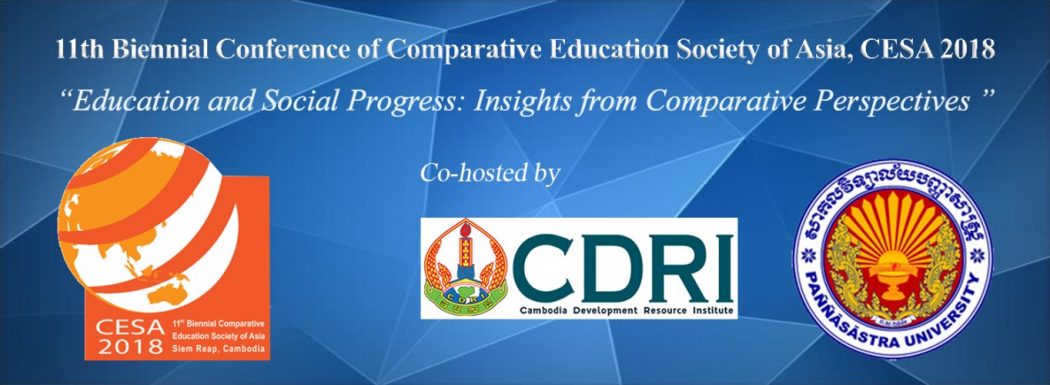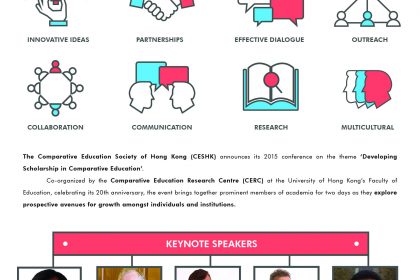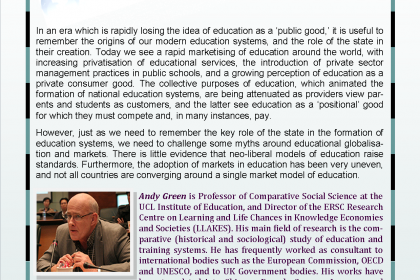11th Biennial Comparative Education Society of Asia, CESA 2018
‘Education and Social Progress: Insights from Comparative Perspectives’
10 – 12 May 2018
Siem Reap, Cambodia
It is generally assumed that education contributes in diverse ways to the achievement of social progress, equipping individuals with skills that enhance their employability, health, family life, civic engagement and overall sense of fulfilment. On this basis, providing quality and inclusive education has been set as one of the United Nations’ sustainable development priorities (SDG4) to be achieved by 2030. However, international understandings not only of what quality and inclusivity entail, but of the social vision to whose achievement education should contribute, remain widely divergent. Meaningful cross-national debate over best practice with respect to pedagogy, educational governance, schooling for girls or minorities and a range of other matters assumes consensus over the fundamental goals of schooling – a consensus that in reality remains elusive.
Scholars in the field of comparative and international education have challenged melioristic approaches to education ever since Marc-Antoine Jullien proposed a science of educational comparison based on supposed facts in 1817. But unreflective meliorism and narrow economism continue to dominate much education policy debate, fuelled in recent years not least by official and media responses to the OECD’s PISA tests. A pressing task for scholars in Asia and beyond is therefore to challenge each other – and the wider public – to reflect on what we mean when we talk of education as an instrument for social progress. Precisely what visions of a better society do we aspire to progress towards? How can education contribute to such progress? And to what extent should we see education not only in instrumental terms – as a tool for achieving progress, however defined – but also as constitutive in itself of the good life for which we aim? With these questions in mind, we have selected as the theme for CESA’s 2018 biennial conference “Education and Social Progress: Insights from Comparative Perspectives.”
Reflecting on such questions should also prompt us to reconsider our own mission as educational comparativists: What is the main purpose of comparative education? What have been the contributions of different traditions – from Asia and beyond – to the development of comparative research and the shaping of the concerns that inform it? What insights or perspectives have been overlooked in this process, and how might the field benefit from their incorporation? What theoretical and methodological approaches should comparativists adopt in order to investigate educational issues not merely from a narrowly utilitarian perspective, but also take account of the ethical and cultural complexity that is inescapably associated with them?
CESA’s 2018 conference will be held on 10–12 May 2018 in Siem Reap, which is home to the world’s renowned Angkor Wat and many other archaeological and cultural sites. We invite abstract proposals for papers, panels, poster sessions and workshops dealing with all aspects of education – formal, non-formal or informal, at all levels from early childhood to college and beyond. Proposals should address one of the following subthemes:
- Comparative education in contemporary Asia and beyond – theoretical and methodological issues
- Educational policy making and the pursuit of progress – structures, aims and processes
- STEM vs the Humanities – defining and addressing social needs through curricular change
- Pedagogical innovation and new technology – a force for progress or digital disruption?
- Paying for progress in education – public provision, privatisation and marketisation
- Measuring educational progress – administering and monitoring education systems
- Educational progress for all – challenges of gender, diversity and inclusion
- Citizenship education and political socialisation – nationalism, transnationalism and peace
- Education and the pursuit of economic and environmental sustainability
- Globalisation, migration and transnational collaboration in education
- Civil society’s involvement in education and its implications
- Lifelong learning and skills discourse – liberating the individual or privatising risk?
Proposals must be in English, which is the language of the conference. They should be between 250 and 300 words for papers and 500 and 750 words for panels. When submitting your proposal, please include the following information:
- Title of your paper/panel
- Objectives and research questions
- Significance of the study
- Theoretical/conceptual framework
- Methodology
- Findings
Proposal submissions, which open in mid-August 2017, can be made through email: cesa2018cambodia@gmail.com. The deadline for submissions is Wednesday, 15 November 2017 at 11:59 p.m. (GMT+7). All abstracts will go through a review process and submittees will be notified by late December 2017. For further information about the conference, please visit https://cdri.org.kh/cesa/ or contact Mr Keo Borin, conference coordinator, at cesa2018cambodia@gmail.com.
















